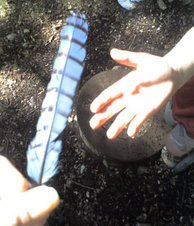
Psychology of Exceptional Children
M4A1: Low-Incidence Exceptionalities: The Deaf Culture
M.L. Crider
Argosy University
July 15, 2017
Low-Incidence Exceptionalities: The Deaf Culture
Birds of a feather flock together. This is what I learned to really understand from the video documentary, Sound and fury: Six years later. It seems in life that whether we are talking about any group of human beings, that people in general or with exceptionalities, feel most comfortable around similar people, i.e. people who live as they live, endure what they endure, and understand what they understand. In the case of exceptionality families, this basic yearning to be near similar people/places/things/situations, seems to be only an intensified yearning.
“Deafness describes people whose hearing loss is in the extreme: 90 dB or greater. Even with the use of hearing aids or other forms of amplification, the primary means for developing language and communication for people who are deaf is through the visual channel. Deafness as defined by the Individuals with Disabilities Education Act (IDEA) means “a hearing impairment which is so severe that the child is impaired in processing linguistic information through hearing, with or without amplification, which adversely affects educational performance” --IDEA, 34 C.F.R. 300.7 (Hardman, 2013, p. 320).”
The deaf family, the Artinians, are a loving family that is used to their own deaf world. They were so used to it, in fact, that when the idea of cochlear implants that could help his children be able to hear were introduced as an option, the family wanted so much for their children to remain in the visual world they live in/understand more than letting them go into the normal world of hearing and seeing, that they physically relocated to Maryland far away from grandparents so that Nita, the deaf mother, could feel more comfortable raising her family.
Peter, the deaf father, was very protective of his children remaining “in the deaf world”, so to speak, and the thought of cochlear implant surgery was so invasive and frightening to him, that he worked in New York four days a week and would commute home to family in Maryland—just so that Nita and the kids felt comfortable in their deaf school and in their deaf community. “04:10PETER ARTINIAN JR. The idea of this cochlear implant surgery is so scary, it's so invasive. They drill through the skull and have to go very deeply inside. I'm afraid that cochlear implants are going to create a bunch of robots. It just doesn’t seem right for a deaf person because our natural communication is signing and being in the deaf world (Aronson, 2006).”
The above speaks volumes if we really (ironically)… listen. Another touching part of the documentary was when the deaf mother, Nita, questioned her young deaf child, Heather, about being implanted (below script). The grandparents fought with Nita and Peter about their reticence to implant the children because the grandparents thought it would be in the best interest of the children:
“01:55NITA ARTINIAN Why do you want a cochlear implant now?
HEATHER ARTINIAN Because I want to hear everything.
02:00NITA ARTINIAN Everything?
HEATHER ARTINIAN I need to hear alarms, smoke detectors for fire and what else? (Aronson, 2006).”
The fighting conversation on video went like this and let us understand the depth and emotional strain that this placed on Nita and Peter (the parents) and Mari and her husband (grandparents who wanted the cochlear implants for their grandchildren):
“04:55NITA ARTINIAN We are a deaf family. Peter and I grew up deaf, we know what it's like growing up in a hearing culture. You don’t understand deaf people's feelings.
05:00MARI ARTINIAN (inaudible) deaf way. There are both worlds here. You only want deaf world for your children. You are limiting your children, you are forcing them.
05:10PETER ARTINIAN JR. Ma…
05:15MARI ARTINIAN Wait a minute. You are forcing them to live only in a deaf world. You are not…
05:20NITA ARTINIAN Heather's Mother That's not true, Mari. That is not true. When we decided not to do the implant everything was so messed up. My mother-in-law was angry, my dear friends were angry, I was angry, and I just said that’s it. I just had to drop it. That’s why we moved to Maryland. I needed to get out, I needed to protect myself. We wanted to be with deaf people who understood us who are like us (Aronson, 2006).”
This truly helped me to grasp the fear of the Artinians about feeling a strong sense of losing their children forever to the normal world of hearing and seeing instead of leaving their kids in the deaf world with them. They were afraid of this more so than just for the surgical reasons; it seems they were afraid to have their kids abandon the way they live and understand the world. This is a tough decision for the Artinians. Six years later, after Nita had been living in the deaf community in Maryland with the kids, Nita had a breakdown, was medicated, and then Peter moved them all into the grandparents’ home back in New York. At that point in time (six years before Heather’s implants), the grandfather put his foot down and demanded that Peter and Nita allow their kids the gift of hearing in the normal world. The angst that is seen and felt in this documentary shows that every person thinks their own world is “the normal world”. We must truly have empathy and compassion for this fact in order to be able to understand fully what is in the best interest of a family.
Regarding the medical and scientific side of things, Dr. Simon Parisier, cochlear implant surgeon, had this to say about the critical nature of timing with regards to the age of the children and the timeframe with regards to speech and memory. This has to do with the prelingual hearing loss (below age 2 or speech learning age) versus the postlingual hearing loss (above age 2):
“02:15DR. SIMON PARISIER Cochlear Implant Surgeon The younger the person who receives a cochlear implant, the more likely they ought to develop clear understandable speech. Children who are implanted at one year of age develop language skills that are very similar to normal hearing kids. There is always a slight language delay, which you can't seem to erase, but in a one-year-old that language delay is just a matter of a few months. The older the child gets, the greater the gap there is between a normal hearing child and a child who is profoundly deaf (Aronson, 2006).”
“In addition to the individual’s sensitivity to loudness and pitch, two other factors are involved in defining deafness and hard of hearing: the age of onset and the anatomical site of the loss. Hearing loss may be present at birth (congenital) or acquired at any time during life. Prelingual loss occurs prior to the age of 2, or before speech development. Postlingual loss occurs at any age following speech acquisition. In nine out of ten children, deafness occurs at birth or prior to the child’s learning to speak. The distinction between a congenital and an acquired hearing loss is important. The age of onset will be a critical variable in determining the type and extent of interventions necessary to minimize the effect of the individual’s disability. This is particularly true in relation to speech and language development. A person who is born with hearing loss has significantly more challenges, particularly in the areas of communication and social adaptation (Hardman, 20130101, p. 320).”
If I were to work with a deaf family in helping them to be able to decide such huge life markers, such broad and deep decisions of changing their worlds, I would recommend that they invite me into their home—as once upon a time our medical doctors used to do back in the 1950s, knowing that families must learn to trust a physician and to leave this important socioemotional component out of our equation is to practice a faulty equation—and let me eat dinner with them, coexist with them, share time with them in their own environment that brings comfort and ritual.
Being in their own home environment seems vital; this is to set up trust. I do not believe a doctor in a white suit at a hospital—no matter how sincere or well-meaning—could win the confidence of a deaf family because their knowing of the lack of understanding would still be present and a hurdle for being able to introduce the medical side of things and the options for them to consider.
After having attempted to set up a bond of trust with the exceptionality family, I would with much empathy, respect, and compassion, only then present them with the medical evidence, support groups and community resources that would help them to transition into living a completely different life, aka a different world, in their same lifetimes. To us “normal-hearing-folk”, it may seem that simply getting cochlear implants would be immediately beneficial, but we must consider that for the child, such as Heather, this is literally having her wake up to a new morning in a brand-new world.
Do we understand how strange it is for a Bipolar person who is highly familiar with riding waves of mania/inspiration with varying alternating episodes of black depressions to suddenly be on medication that halts all of this? Mania/depression cycles used to be his/her “normal world”. Now, being on medication, the person literally is faced with an even world—i.e. one that suddenly robs the inspiration/mania and voids the black depressions. As seemingly beneficial as this may be on the outside looking in, can we really ever know—ever truly be able to be them in order to get a glimpse or a dose of how exactly foreign this “new existence” is for them?
This innocent, but pragmatic lack of understanding should not be minimized in our practice when trying to assist a family with exceptionality—with any exceptionality. Even those with ASD, Bipolar Disorder, and other so-called “disorders”, we must understand that simply putting a person on medication could change his/her entire life and lifestyle, i.e. his/her comfort zone in how to exist and thrive, and like the deaf family, it will be altering his/her/their whole world.
“The U.S. Department of Education (2011) indicated that more than 73,000 students defined as having a hearing impairment and between the ages of 6 and 21 are receiving special education services. These students account for approximately .1 percent of school-age students identified in the United States as having a disability (Hardman, 2013, p. 322).”
It cannot seem to be stressed enough that empathy, understanding and compassion—a real and honest appraisal and understanding—should be fully employed by us clinicians who attempt to win the confidence of a deaf family—or any low-incidence exceptionality family—so that the medical aspects can be introduced with less threat and with less fear for the family to be able to consider.
References
Aronson, J. (Producer & Director). (2006). Sound and fury: Six years later [Documentary]. United States: Filmakers Library. Retrieved from http://flon.alexanderstreet.com.libproxy.edmc.edu/View/1650486 and http://search.alexanderstreet.com.libproxy.edmc.edu/view/work/1785113
Hardman, M. L. (2013). Human Exceptionality: School, Community, and Family, 11th Edition [VitalSource Bookshelf version]. Retrieved from https://bookshelf.vitalsource.com/books/9781285594972
M4A1: Low-Incidence Exceptionalities: The Deaf Culture
M.L. Crider
Argosy University
July 15, 2017
Low-Incidence Exceptionalities: The Deaf Culture
Birds of a feather flock together. This is what I learned to really understand from the video documentary, Sound and fury: Six years later. It seems in life that whether we are talking about any group of human beings, that people in general or with exceptionalities, feel most comfortable around similar people, i.e. people who live as they live, endure what they endure, and understand what they understand. In the case of exceptionality families, this basic yearning to be near similar people/places/things/situations, seems to be only an intensified yearning.
“Deafness describes people whose hearing loss is in the extreme: 90 dB or greater. Even with the use of hearing aids or other forms of amplification, the primary means for developing language and communication for people who are deaf is through the visual channel. Deafness as defined by the Individuals with Disabilities Education Act (IDEA) means “a hearing impairment which is so severe that the child is impaired in processing linguistic information through hearing, with or without amplification, which adversely affects educational performance” --IDEA, 34 C.F.R. 300.7 (Hardman, 2013, p. 320).”
The deaf family, the Artinians, are a loving family that is used to their own deaf world. They were so used to it, in fact, that when the idea of cochlear implants that could help his children be able to hear were introduced as an option, the family wanted so much for their children to remain in the visual world they live in/understand more than letting them go into the normal world of hearing and seeing, that they physically relocated to Maryland far away from grandparents so that Nita, the deaf mother, could feel more comfortable raising her family.
Peter, the deaf father, was very protective of his children remaining “in the deaf world”, so to speak, and the thought of cochlear implant surgery was so invasive and frightening to him, that he worked in New York four days a week and would commute home to family in Maryland—just so that Nita and the kids felt comfortable in their deaf school and in their deaf community. “04:10PETER ARTINIAN JR. The idea of this cochlear implant surgery is so scary, it's so invasive. They drill through the skull and have to go very deeply inside. I'm afraid that cochlear implants are going to create a bunch of robots. It just doesn’t seem right for a deaf person because our natural communication is signing and being in the deaf world (Aronson, 2006).”
The above speaks volumes if we really (ironically)… listen. Another touching part of the documentary was when the deaf mother, Nita, questioned her young deaf child, Heather, about being implanted (below script). The grandparents fought with Nita and Peter about their reticence to implant the children because the grandparents thought it would be in the best interest of the children:
“01:55NITA ARTINIAN Why do you want a cochlear implant now?
HEATHER ARTINIAN Because I want to hear everything.
02:00NITA ARTINIAN Everything?
HEATHER ARTINIAN I need to hear alarms, smoke detectors for fire and what else? (Aronson, 2006).”
The fighting conversation on video went like this and let us understand the depth and emotional strain that this placed on Nita and Peter (the parents) and Mari and her husband (grandparents who wanted the cochlear implants for their grandchildren):
“04:55NITA ARTINIAN We are a deaf family. Peter and I grew up deaf, we know what it's like growing up in a hearing culture. You don’t understand deaf people's feelings.
05:00MARI ARTINIAN (inaudible) deaf way. There are both worlds here. You only want deaf world for your children. You are limiting your children, you are forcing them.
05:10PETER ARTINIAN JR. Ma…
05:15MARI ARTINIAN Wait a minute. You are forcing them to live only in a deaf world. You are not…
05:20NITA ARTINIAN Heather's Mother That's not true, Mari. That is not true. When we decided not to do the implant everything was so messed up. My mother-in-law was angry, my dear friends were angry, I was angry, and I just said that’s it. I just had to drop it. That’s why we moved to Maryland. I needed to get out, I needed to protect myself. We wanted to be with deaf people who understood us who are like us (Aronson, 2006).”
This truly helped me to grasp the fear of the Artinians about feeling a strong sense of losing their children forever to the normal world of hearing and seeing instead of leaving their kids in the deaf world with them. They were afraid of this more so than just for the surgical reasons; it seems they were afraid to have their kids abandon the way they live and understand the world. This is a tough decision for the Artinians. Six years later, after Nita had been living in the deaf community in Maryland with the kids, Nita had a breakdown, was medicated, and then Peter moved them all into the grandparents’ home back in New York. At that point in time (six years before Heather’s implants), the grandfather put his foot down and demanded that Peter and Nita allow their kids the gift of hearing in the normal world. The angst that is seen and felt in this documentary shows that every person thinks their own world is “the normal world”. We must truly have empathy and compassion for this fact in order to be able to understand fully what is in the best interest of a family.
Regarding the medical and scientific side of things, Dr. Simon Parisier, cochlear implant surgeon, had this to say about the critical nature of timing with regards to the age of the children and the timeframe with regards to speech and memory. This has to do with the prelingual hearing loss (below age 2 or speech learning age) versus the postlingual hearing loss (above age 2):
“02:15DR. SIMON PARISIER Cochlear Implant Surgeon The younger the person who receives a cochlear implant, the more likely they ought to develop clear understandable speech. Children who are implanted at one year of age develop language skills that are very similar to normal hearing kids. There is always a slight language delay, which you can't seem to erase, but in a one-year-old that language delay is just a matter of a few months. The older the child gets, the greater the gap there is between a normal hearing child and a child who is profoundly deaf (Aronson, 2006).”
“In addition to the individual’s sensitivity to loudness and pitch, two other factors are involved in defining deafness and hard of hearing: the age of onset and the anatomical site of the loss. Hearing loss may be present at birth (congenital) or acquired at any time during life. Prelingual loss occurs prior to the age of 2, or before speech development. Postlingual loss occurs at any age following speech acquisition. In nine out of ten children, deafness occurs at birth or prior to the child’s learning to speak. The distinction between a congenital and an acquired hearing loss is important. The age of onset will be a critical variable in determining the type and extent of interventions necessary to minimize the effect of the individual’s disability. This is particularly true in relation to speech and language development. A person who is born with hearing loss has significantly more challenges, particularly in the areas of communication and social adaptation (Hardman, 20130101, p. 320).”
If I were to work with a deaf family in helping them to be able to decide such huge life markers, such broad and deep decisions of changing their worlds, I would recommend that they invite me into their home—as once upon a time our medical doctors used to do back in the 1950s, knowing that families must learn to trust a physician and to leave this important socioemotional component out of our equation is to practice a faulty equation—and let me eat dinner with them, coexist with them, share time with them in their own environment that brings comfort and ritual.
Being in their own home environment seems vital; this is to set up trust. I do not believe a doctor in a white suit at a hospital—no matter how sincere or well-meaning—could win the confidence of a deaf family because their knowing of the lack of understanding would still be present and a hurdle for being able to introduce the medical side of things and the options for them to consider.
After having attempted to set up a bond of trust with the exceptionality family, I would with much empathy, respect, and compassion, only then present them with the medical evidence, support groups and community resources that would help them to transition into living a completely different life, aka a different world, in their same lifetimes. To us “normal-hearing-folk”, it may seem that simply getting cochlear implants would be immediately beneficial, but we must consider that for the child, such as Heather, this is literally having her wake up to a new morning in a brand-new world.
Do we understand how strange it is for a Bipolar person who is highly familiar with riding waves of mania/inspiration with varying alternating episodes of black depressions to suddenly be on medication that halts all of this? Mania/depression cycles used to be his/her “normal world”. Now, being on medication, the person literally is faced with an even world—i.e. one that suddenly robs the inspiration/mania and voids the black depressions. As seemingly beneficial as this may be on the outside looking in, can we really ever know—ever truly be able to be them in order to get a glimpse or a dose of how exactly foreign this “new existence” is for them?
This innocent, but pragmatic lack of understanding should not be minimized in our practice when trying to assist a family with exceptionality—with any exceptionality. Even those with ASD, Bipolar Disorder, and other so-called “disorders”, we must understand that simply putting a person on medication could change his/her entire life and lifestyle, i.e. his/her comfort zone in how to exist and thrive, and like the deaf family, it will be altering his/her/their whole world.
“The U.S. Department of Education (2011) indicated that more than 73,000 students defined as having a hearing impairment and between the ages of 6 and 21 are receiving special education services. These students account for approximately .1 percent of school-age students identified in the United States as having a disability (Hardman, 2013, p. 322).”
It cannot seem to be stressed enough that empathy, understanding and compassion—a real and honest appraisal and understanding—should be fully employed by us clinicians who attempt to win the confidence of a deaf family—or any low-incidence exceptionality family—so that the medical aspects can be introduced with less threat and with less fear for the family to be able to consider.
References
Aronson, J. (Producer & Director). (2006). Sound and fury: Six years later [Documentary]. United States: Filmakers Library. Retrieved from http://flon.alexanderstreet.com.libproxy.edmc.edu/View/1650486 and http://search.alexanderstreet.com.libproxy.edmc.edu/view/work/1785113
Hardman, M. L. (2013). Human Exceptionality: School, Community, and Family, 11th Edition [VitalSource Bookshelf version]. Retrieved from https://bookshelf.vitalsource.com/books/9781285594972

 RSS Feed
RSS Feed



